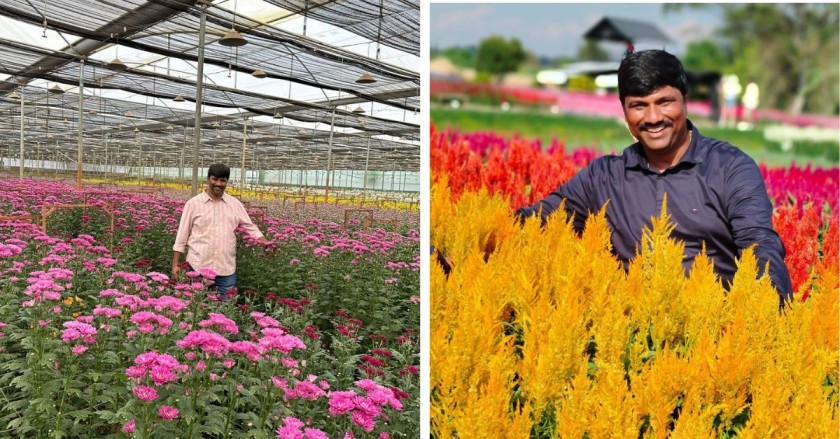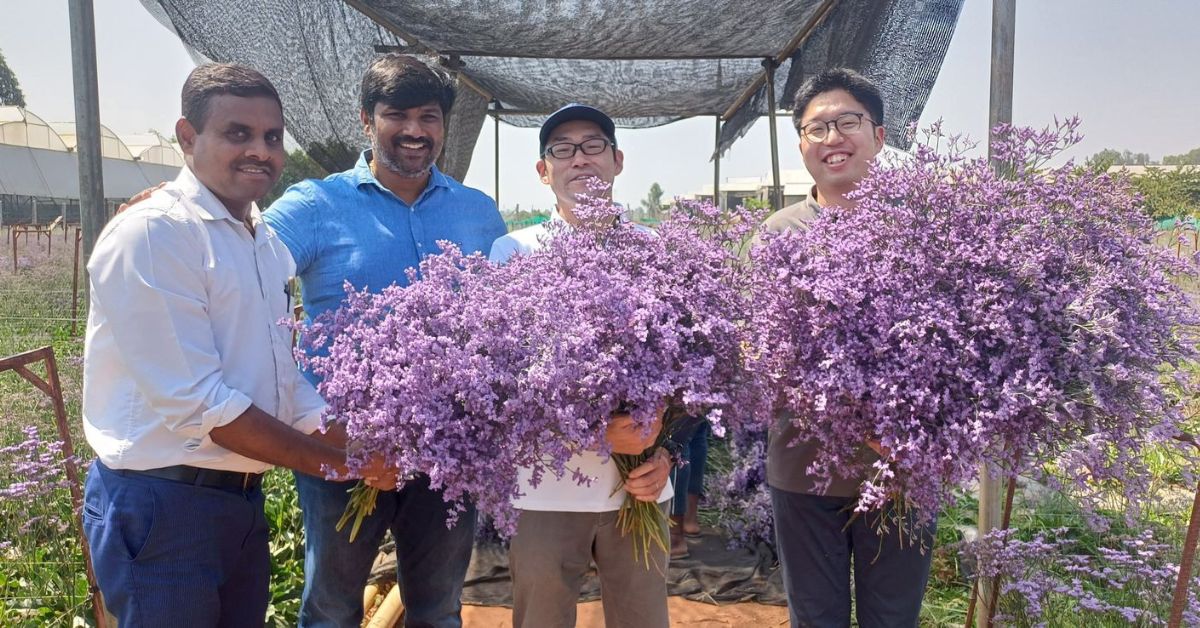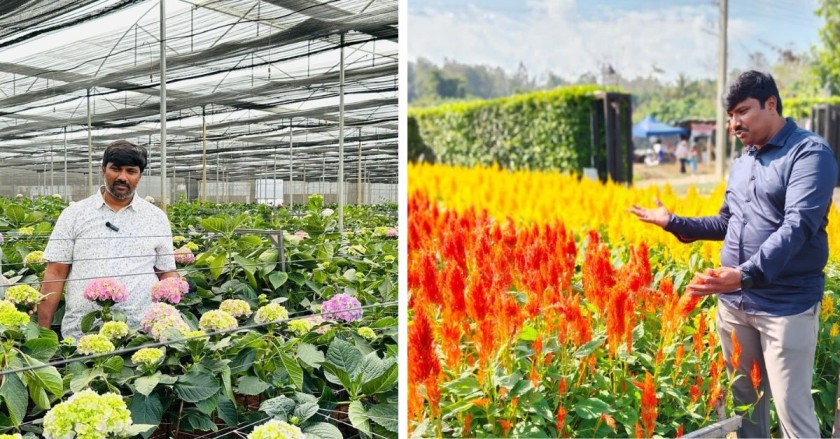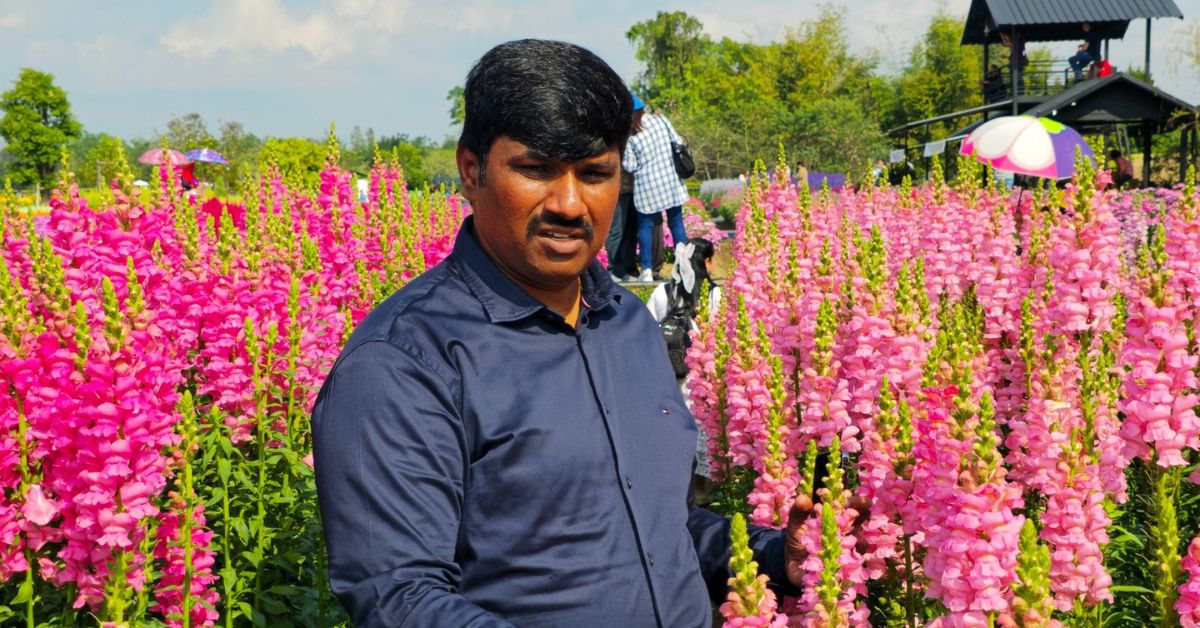‘Something of My Own’: Farmer Fought Poverty by Growing Flowers; Earns Rs 70 Cr a Year
Born in a family of traditional farmers, Srikanth Bollapally lived in poverty as a child. He decided to take a different route and started growing flowers. Today, with a farmland of over 50 acres, he is earning crores every year.

Srikanth Bollapally’s days are now filled with the glow of success. Residing in Bengaluru, this flower farmer is living the dream he cherished in his youth.
At 40, Srikanth is reaping significant profits from his floriculture venture. He cultivates 12 varieties of flowers across his 40-acre farmland near Doddaballapura, Bengaluru.
With customers from all across the country, Srikanth earns a turnover of Rs 70 crore in a year, working with a team of more than 200 people from across rural Karnataka.
However, while these numbers seem staggering, the road to success for Srikanth was not a bed of roses.
“I worked for Rs 1,000 per month because I needed the money. It was determination and patience that led me to where I am today,” Srikanth shares in a conversation with The Better India.
So, how did a young Srikanth forge his way to success, and how can you enter the floriculture industry? Here’s his story.
Farming in his blood
Born and raised in a family of farmers in the Nizamabad district of Telangana, Srikanth describes his idea of work to be just farming.
“In my head, there was no other profession for me. Farming felt like an obvious choice to me,” he says.
However, farming did not benefit the family much.
“We were drowning in poverty and debt. There were so many challenges with the profession and very less profits. I wanted to get educated but I was in class 10 when my parents told me that they can no longer fund my education,” he shares.
Stricken with poverty, he had to work to support the family income. “I was 16 and had to start working. I got an opportunity to work with a relative in Bengaluru. We had heard that floriculture was gaining momentum there and I decided to join the relative,” he says.

In 1995, Srikanth moved to Bengaluru with dreams of doing something. “However, the money that I was being paid was very little. It was only a thousand rupees a month, but I had little choice,” he says.
After working for a year, Srikanth equipped himself with the tricks of the trade, learning everything from cultivation, harvesting, marketing, and even export of the flowers.
“I could clearly see that there was immense potential in the business and I decided to take a leap of faith and do something of my own. Back then, with no financial support and very little savings, I started to source flowers from farmers and trade them,” he says.
In 1997, he opened a small flower shop in the city. “I did that for more than a decade and was making reasonable profits. However, I had an urge to do more. I knew there was immense potential if you knew the right flowers to grow,” he shares.
Wanting to start his farm, Srikanth decided to start growing his own flowers. “I had a lot of contacts in the industry, including buyers and other floriculturists. White the idea of buying my own land and starting a farm was alluring, it came with its own set of challenges,” he says.
A multi-crore flower empire
The first challenge that he was presented with was investment. “The per acre investment in a flower farm is much more than a traditional farm. Since the investment is high, the risks are high too,” he explains.
While Srikanth had some savings, he also turned to the government for support. “The government gives a lot of support to individuals like me. I drew up a plan and approached the National Horticulture Board to get loans and subsidies,” he shares.
Accumulating loans from the government and investing all his savings into buying his first piece of land. He started with 10 acres and has now grown to 52 acres of farmland.

Talking about the other difficulties that he faced while setting up the farm, he says, “Farming does come with a bunch of risks, especially with changes in climate conditions. As a young man in the business, it was very difficult for me to garner the trust of investors and banks. Once that was done, things became easier.”
Srikanth grows 12 varieties of flowers in his 52-acre farmland. These flowers include Roses, Gerbera, Carnations, Gypsophila among others that are grown organically in greenhouses and polyhouses.
“We try to be as organic and sustainable as possible while cultivating our flowers. All the waste that is produced once the flowers are ready to be shipped is used to make vermicompost which is in turn used to fertilise the plant,” he informs.
Being in the industry for decades, Srikanth has learned a few lessons that he carries and shares with everyone.
“There is a general trend in the society, especially in the youth, to not become farmers. This is mostly because of the idea that there are no profits. However, if you play your cards right, there is a lot of money to be made in this industry,” he shares.
“For all those who are wanting to enter the industry, it is a great time to be here. However, if you are in it for quick profits and subsidies, then this might not be the right choice. The art of growing flowers requires a lot of patience and hard work. You have to get your hands dirty and be vigilant with your flowers, water them, control pests etc. If you have the determination, nothing is impossible, all you need is faith and patience,” he adds.

Srikanth’s customers range from wholesalers, retailers, wedding planners and others spread all across the country.
Looking back at his journey so far, he says, “I wanted to study further as a young man but life seemed to have other plans. At one point, there was no planning. I was just following the path in front of me and worked hard, these are the only two things I did,” he notes.
(Edited by Padmashree Pande)
If you found our stories insightful, informative, or even just enjoyable, we invite you to consider making a voluntary payment to support the work we do at The Better India. Your contribution helps us continue producing quality content that educates, inspires, and drives positive change.
Choose one of the payment options below for your contribution-
By paying for the stories you value, you directly contribute to sustaining our efforts focused on making a difference in the world. Together, let's ensure that impactful stories continue to be told and shared, enriching lives and communities alike.
Thank you for your support. Here are some frequently asked questions you might find helpful to know why you are contributing?















